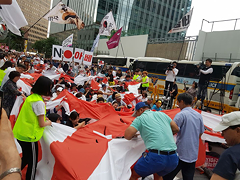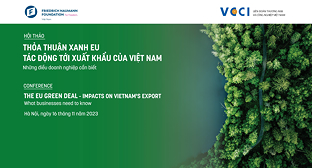(Korea) Protesters condemn Japan's export curbs
22/07/2019 12:00

More than 1,000 protesters took to the streets Saturday to condemn Japan's Shinzo Abe administration for its economic retaliation against Korean Supreme Court rulings ordering compensation for individual wartime forced laborers.
Activists from around 100 civic groups, including one of the main umbrella trade unions and the Korea Alliance for Progressive Movements (KAPM), rallied in front of the former Japanese embassy site in Jongno-gu, filling the street between the former embassy and a statue depicting a girl mobilized to serve in Japanese military brothels during World War II.
"Apologize for forced labor, withdraw retaliatory trade restrictions," the groups chanted. One held a handmade sign reading, "There can be no future of peace without proper repentance for colonialism."
Protesters focused their barrage on Japan's conservative leader Abe, who is poised to become Japan's longest-serving prime minister.
"Our Supreme Court ruling recognized (individuals' right to) compensation for Japan's human rights violations," KAPM Chairman Park Seok-woon, told the rally. "Abe and his gang are trying to restrict that fundamental right with unreasonable economic retaliation."
Following the speeches, protesters tore apart a large Rising Sun flag, a symbol of Imperial Japan and its military colonialism.
Before the main rally began at 6 p.m., university students marched around the Anguk-dong area, holding "Abe Out" signs that accused the Japanese prime minister of "using" Korea and endorsing false historical views to unite conservative voters for a Japanese parliamentary election on Sunday.
Japan's export ban on key chemicals to Korea includes fluorinated polyamide, photoresists and hydrogen etching gas, essential components in Samsung and LG Hynix's semiconductors and chips for which Japanese suppliers have a dominant market share.
The trade war follows landmark rulings in Korea since last year, ordering Japanese firms like Nippon Steel and Mitsubishi to compensate wartime forced laborers. The firms, strongly backed by the Japanese government, have refused to pay the legal reparations, saying the 1965 bilateral accord permanently closed the case on all colonial and wartime reparation issues.
The export curbs have struck a raw nerve in Koreans, who continue to demand a full apology from its former colonizer to acknowledge all the facts and accept legal responsibility.
Abe's move ― clearly intended to force Korean President Moon Jae-in's hand in the forced labor dispute ― spurred a mass boycott of popular Japanese brands and travel destinations. Despite the present sale season, Uniqlo shops have stood deserted in downtown Seoul and families have paid hefty fees to cancel summer trips to Japanese destinations.
Source: The Korea Times
Activists from around 100 civic groups, including one of the main umbrella trade unions and the Korea Alliance for Progressive Movements (KAPM), rallied in front of the former Japanese embassy site in Jongno-gu, filling the street between the former embassy and a statue depicting a girl mobilized to serve in Japanese military brothels during World War II.
"Apologize for forced labor, withdraw retaliatory trade restrictions," the groups chanted. One held a handmade sign reading, "There can be no future of peace without proper repentance for colonialism."
Protesters focused their barrage on Japan's conservative leader Abe, who is poised to become Japan's longest-serving prime minister.
"Our Supreme Court ruling recognized (individuals' right to) compensation for Japan's human rights violations," KAPM Chairman Park Seok-woon, told the rally. "Abe and his gang are trying to restrict that fundamental right with unreasonable economic retaliation."
Following the speeches, protesters tore apart a large Rising Sun flag, a symbol of Imperial Japan and its military colonialism.
Before the main rally began at 6 p.m., university students marched around the Anguk-dong area, holding "Abe Out" signs that accused the Japanese prime minister of "using" Korea and endorsing false historical views to unite conservative voters for a Japanese parliamentary election on Sunday.
Japan's export ban on key chemicals to Korea includes fluorinated polyamide, photoresists and hydrogen etching gas, essential components in Samsung and LG Hynix's semiconductors and chips for which Japanese suppliers have a dominant market share.
The trade war follows landmark rulings in Korea since last year, ordering Japanese firms like Nippon Steel and Mitsubishi to compensate wartime forced laborers. The firms, strongly backed by the Japanese government, have refused to pay the legal reparations, saying the 1965 bilateral accord permanently closed the case on all colonial and wartime reparation issues.
The export curbs have struck a raw nerve in Koreans, who continue to demand a full apology from its former colonizer to acknowledge all the facts and accept legal responsibility.
Abe's move ― clearly intended to force Korean President Moon Jae-in's hand in the forced labor dispute ― spurred a mass boycott of popular Japanese brands and travel destinations. Despite the present sale season, Uniqlo shops have stood deserted in downtown Seoul and families have paid hefty fees to cancel summer trips to Japanese destinations.
Source: The Korea Times
Các tin khác
- Domestic retailers eye export-quality products (19/04/2024)
- Korea extends tariff exemption for imported fruits (19/04/2024)
- Anti-dumping duties against US chicken remain in place (19/04/2024)
- Businesses capitalize on recovery momentum to explore market expansion (17/04/2024)
- Canada is second largest consumer of Vietnamese pangasius in CPTPP bloc (17/04/2024)
 Home
Home
 About Us
About Us




















